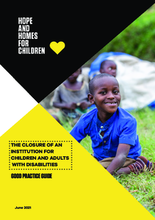Hope and Homes for Children and its stakeholders documented the process of de-institutionalization (DI) of children with disabilities specifically the good practice in the closure of institutions. The exercise was conducted for the two pilot centres, Wikwiheba Mwana and Inshuti Zacu, located in Gatsibo and Kicukiro districts respectively.
This document outlines 5 key steps that serve as an effective blueprint for a successful reintegration process of children and disabilities. These include ‘engagement’, ‘Assessment’, ‘Design & Development’, ‘Transition’, and ‘Monitoring & Evaluation’. The engagement step is a continuum that seeks to clarify the circumstances leading to children’s separation from their families, attitudes of families towards institutional care, overall practices and attitudes towards institutional care among institution owners. It allows to inform stakeholders the importance of family based care and seek their participation in De-Institutionalization.
Secondly, the assessment step aims to map existing resources and establish support needed for future placement of children with disabilities. Assessments also enable identification of needs and support for case management and service delivery. Thirdly, the design and development step entails selection of cost-effective alternatives for successful reintegration of children with disabilities into families while ensuring support provided aligns to circumstances and needs of the families. Fourthly, the transition step ensures that children with disabilities and families including foster families are prepared adequately for family-based care.
It is important that all stakeholders are actively contributing to the transition process. Lastly, monitoring and evaluation plays a crucial role in ensuring quality assurance of the interventions provided specifically whether there is impact being realised by the primary beneficiary i.e. children with disabilities
Interactions with different stakeholders shows evidence of positive impact among children with disabilities as a result of institution closure. Children with disabilities have continued to experience tremendous improvement in terms of wellbeing, healthy family relations, improved health conditions, and linkage to community resources among others. Despite expressed fears, the reintegration of children with disabilities into family-based care is possible when all steps of the DI have been adhered to. Furthermore, for sustainability to be guaranteed, it is important to engage all stakeholders at all stages of the DI process.
A lot remains to be done to address identified systemic gaps and challenges in the DI process, including inaccurate background information on children with disabilities, inadequate services at health facilities and schools, poor mindset and low engagement by institutions, communities and families, among others.
A number of recommendations have been highlighted to facilitate the improvement of reintegration of children with disabilities into family-based care. Some of these include monitoring and evaluating all reintegrated cases before nationwide scale up; strengthening family ties with all family members before the placement of children with disabilities; creating strong networks around children with disabilities including parents/ caregiver, local leaders, and frontline volunteers (IZU) to strengthen linkages; addressing concerns of stakeholders (other than resistance) regarding DI; ensuring that Community Based Health Insurance (Mutuelle de Santé) covers all disability related ailments; and design and operationalize a comprehensive database for all children with disabilities in institutions and the community.
Related:

